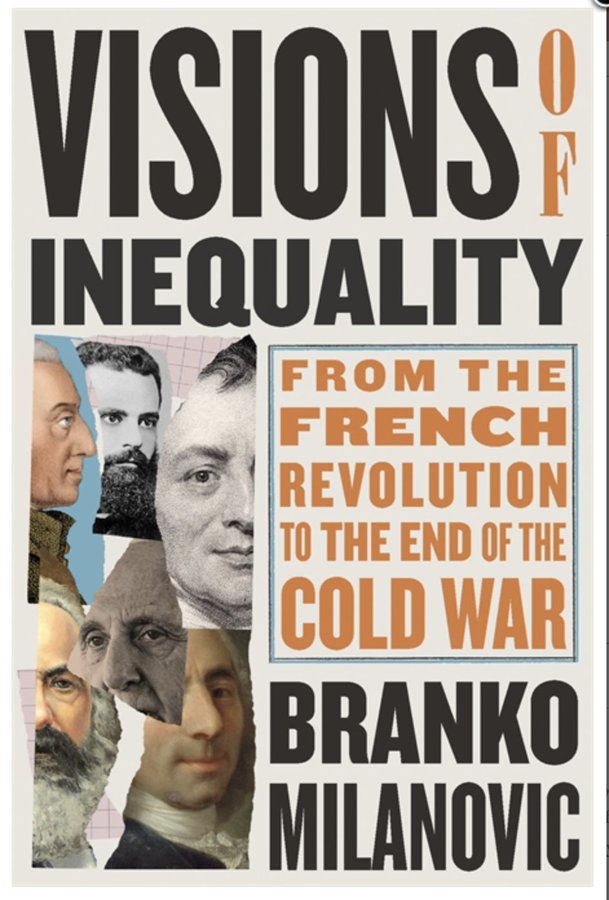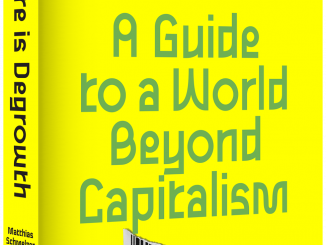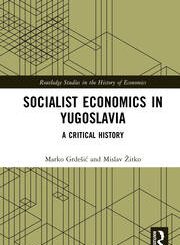Book Review by Mathew D. Rose
Although the topic of inequality is vital to today’s discussions about politics and economics, it is surprising how little importance was attributed to it in the past. Until the middle of the nineteenth century social class and its inequalities were simply a fact of life, something embedded in society. Just as a king was born to the throne, one was born into one’s social class. One might move up within one’s class, for example from lower to upper middle clas, but that was pretty much the extent of social mobility. That their might be political and economic causes behind inequality was not really a topic for economics until Karl Marx. After that the study of inequality did not become truly relevant until our current millennium as mainstream economists continued to protect their profession from the reality of economic inequality with a panoply of excluding politics from their “science”.
In his book, “Visions of Inequality – From the French Revolution to the End of the Cold War” Branko Milanović traces the development of thought concerning economic inequality by influential economists. He has selected six for his work: François Quesnay, Adam Smith, David Ricardo, Karl Marx, Vilfredo Pareto, and Simon Kuznets. He includes an additional chapter concerning the lack of inequality studies during the Cold War. There is also a brief epilogue in which Milanović looks at the major developments in inequality in economics since 1989, thus ending on a more optimistic note.
Milanović#s goal was “to chart the intellectual history of thinking about inequality and not simply to present a round-up of different economists’ ideas”. The author’s criteria for his selection of the economists for his book are: “A compelling narrative, well developed theory, and empirical evidence”, which truly does limit the field. These were present in various degrees in the case of all six economicsts featured in the book. These vary depending on the economist, but the combination is present throughout.
Milanović takes the trouble of providing some biographical information about the economists whose work he analyses (Kuznet’s skeletal biographical information is for some reason relegated to a footnote). This is not irrelevant with regard to the development of their ideas, as all thinking is influenced by one’s time and place. It also makes for a more interesting read. In that sense it reminded me of Robert Heilbroner’s “The Worldly Philosophers”, which I then read in tandem.
Despite its readability, this book is very dense with information, useful not only for economists, but also for those without economic training.
So why has it taken so long for inequality to become a topic of economics? And why did Angus Deaton recently explain in an interview with regard to the politically powerful libertarian monetarists of the Chicago School of Economics “There is this very strong libertarian belief that inequality is not a proper area of study for economists… The discipline has become unmoored from its proper basis, the study of human welfare… The time has come for economists to get back to serving society.”
To understand the here and now, one has to understand how we got here. This is the focus of Milanović’s book. It is however no technocratic, sterile academic work. By the time the author has reached the final chapter on Cold War economists he has reached a seething point similar to Deaton.
In essence this book is divided into two aspects: the empirical study of inequality and the political aspects, on which I shall concentrate. The various economists presented in the book had clear political views and goals. Ricardo worked in finance, where he made a fortune, and saw the class of landowners as an unproductive brake on the development of the capitalism he was investing in. His focal point was economic growth, and growth meant unfettered capitalism. Although he saw the “correct” distribution of income among the classes as the prerequisite for economic growth, his “correct” distribution was to benefit the capitalist class and speculators like himself. For Ricardo high profits were a “sign of a dynamic and growing economy”. Ricardo, like most economicsts today, was not concerned with social justice.
The radical Marx on the other hand saw equality through redistribution as a bourgeois notion. For the proletariat the end of inequality according to Marx is a classless society with the means of production in the possession of the workers. Marx left his predecessors behind with his theory of exploitation by explaining the system of inequality in capitalism. Economic inequality was no longer determined by nature or social structures, but by economic processes, which Milanović goes to great lengths to explain. According to Marx, under capitalism the working class will always be the loser, something that is dawning these days on a lot of people.
Vilfredo Pareto, who lived from 1848 to 1923, was also driven by a radical political ideology, just that his was extremely reactionary, some claiming he was the ideological father of Italian fascism. Pareto, like Marx, dived into the income statistics of Europe and felt he had found a pattern. According to “Pareto’s Law” incomes were distributed “according to a regular pattern”. This proved that any changes or struggles in society to reduce inequality or poverty were useless. A distributional equilibrium would always restore itself due to human nature.
Kuznets, who lived in the USA, was more of a post-war technocrat. He provided economics with the tools to accurately analyse inequality. His assumption however was that the goal of growth was to increase incomes for the poor and that such changes could be implemented through structural transformations. To deal with inequality required “a shift from market economics to political and social economy”. Despite being a highly respected economist, his views did not fit the economic Zeitgeist of the Cold War and were ignored.
In his final chapter, “The Long Eclipse of Inequality Studies during the Cold War” Milanović cites the failure of a whole generation of economists to deal with the question of inequality: “…the competition between communism and capitalism pushed economics, on both sides, into service of the ruling ideologies’ political ends.”
In the Eastern Block there was officially no inequality as classes had ceased to exist and therefore there was no necessity to look into income distribution. In the West classes had also ceased to exist, “it was just that people had different assets”. Some had their labour that they could sell, others had factories and land, thus everyone lived in a market equality. Although this standstill was ended with the fall of the Soviet Block, Milanović points out that in the West the practice of economics being used to generate public opinions on economic issues has continued through means such as well endowed think tanks and universities: “The right-wing financiers have thus built an integrated system for knowledge creation, divulgation and policy influence.” As Milanović notes, the rich have more to lose from policies that might reduce their wealth. So neo-classical economists adamantly continue to ignore the basis of income inequality: power structures”, instead, as the author explains, their analyses “take place in a political vacuum”.
After Milanović’s devastating criticism of neo-classical economists his epilogue to the book “The New Beginning” comes as a breath of fresh air. In it he cites three developments that might usher in a change in our approach to economic inequality. The one is the work of Thomas Piketty; the other two are technical advances that have expanded the analysis of exploitation to a worldwide scale. Time will tell. As Milanović so well documents, economics is dictated by politics.
It is good to see a new book on the history of economic thought. They are too rare and seldom written with such a thorough and critical approach as in “Visions of Inequality”.
Visions of Inequality – From the French Revolution to the End of the Cold War by Branko Milanović
Publisher: Harvard University Press
ISBN-13: 978-0674264144





I don’t think that Milanovic has done enough research about the after-war decades. There was sociologist Helmut Schoeck’s foundational book about “Envy” (and Schoeck after his return to Germany wrote about “the right to be unequal”). Pragmatically I think that Leftists tend to overestimate the importance of equality for the public – most intelligent people don’t ask “Have I the same as my neighbour?” but “Have I the same or even more than I had ten years ago?” Which is why the afterwar years were such a success.